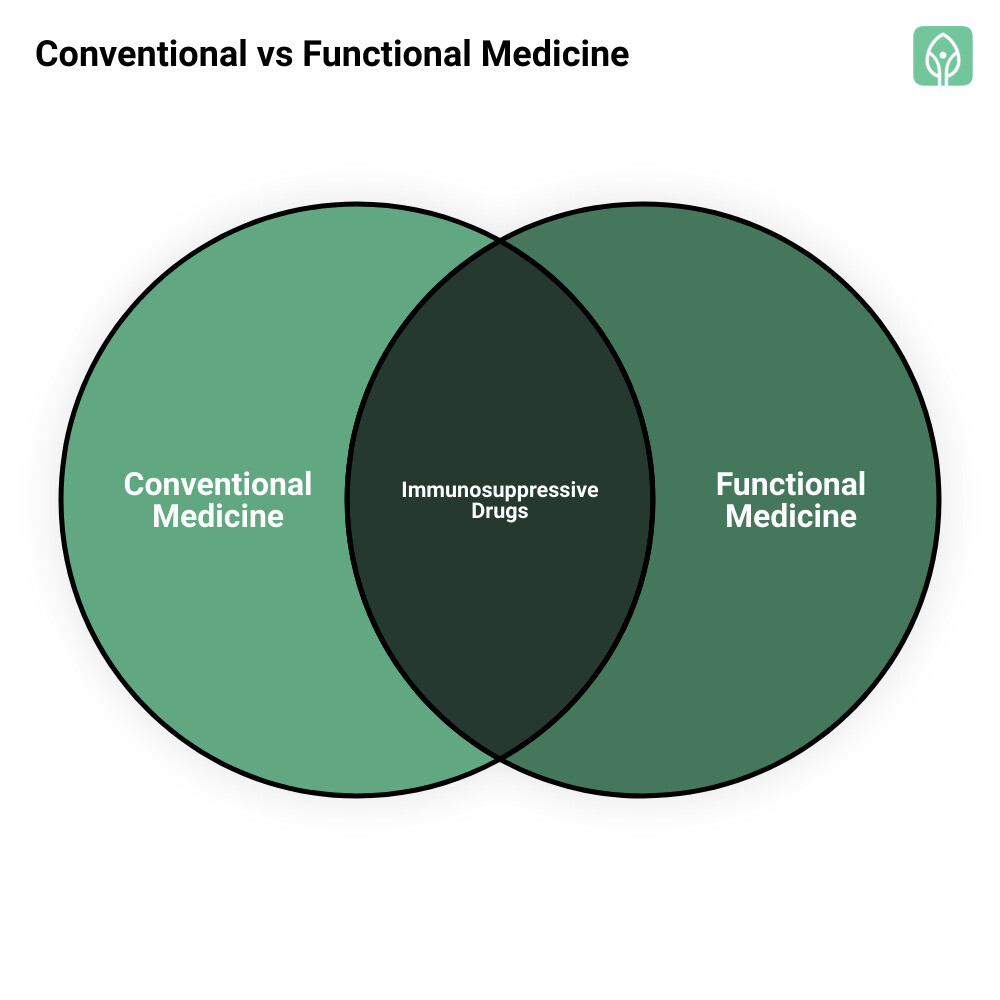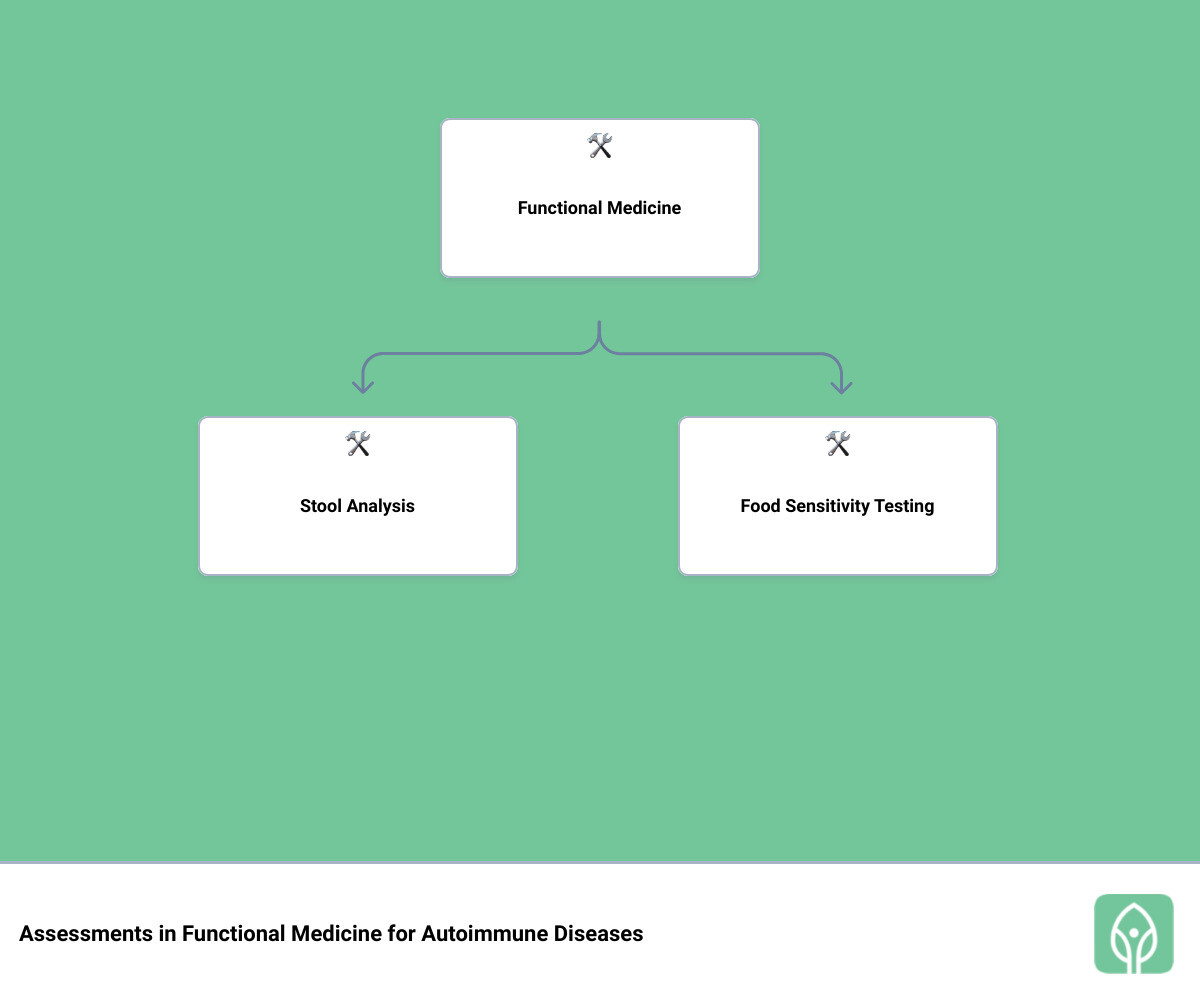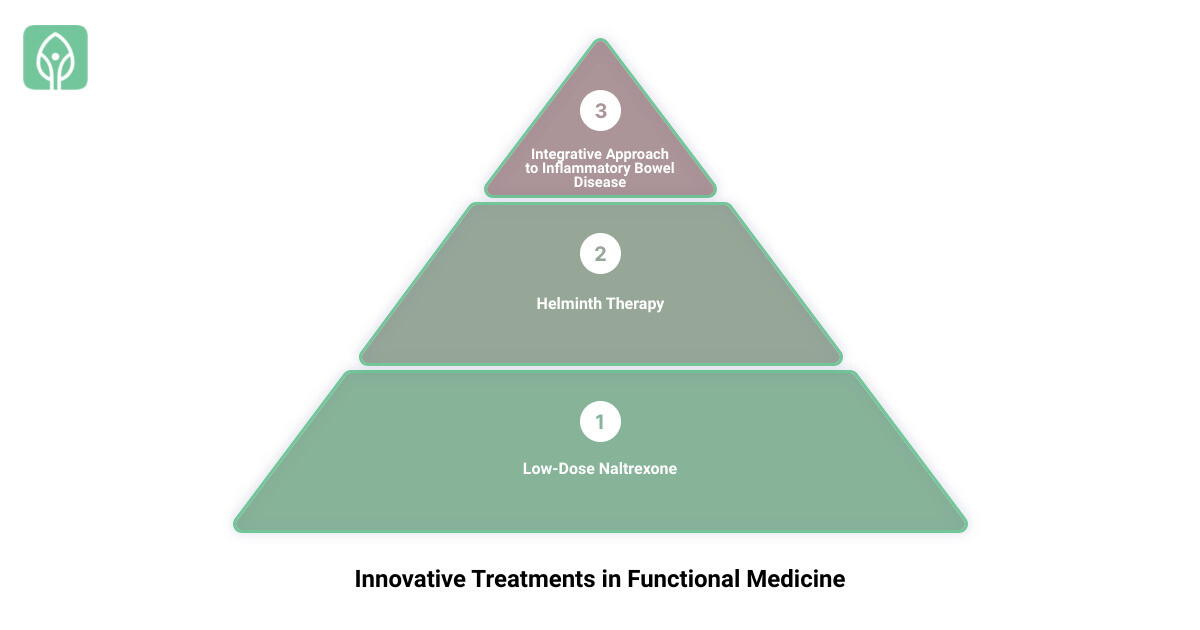Understanding Autoimmune Diseases and the Role of Functional Medicine
Imagine being trapped in a body that fights itself. This is the reality for those suffering from autoimmune diseases. These conditions, which include Hashimoto’s Thyroiditis, lupus, and multiple sclerosis among others, occur when the body’s immune system erroneously attacks its own cells. Autoimmune diseases are on the rise, with many individuals suffering for years without a diagnosis. The current medical approach often involves medications that merely mask the symptoms, leaving the root cause unaddressed. This is where functional medicine, a science-based and personalized approach to healthcare, steps in as a beacon of hope.
At ActiveMed Integrative Health Center, we believe in addressing the root cause of autoimmune diseases rather than just managing symptoms. This article will delve into the dynamics of autoimmune diseases and the transformative role functional medicine plays in their treatment. We aim to explore the physiological underpinnings of these conditions, the rising prevalence in Western societies, and why conventional treatments may not always be the best solution. We’ll also highlight the unique approach of functional medicine in diagnosing and treating autoimmune diseases, focusing on gut health, in-depth assessments, and innovative treatment options.
If you’re a health-conscious individual in Encinitas, Poway, or San Diego, California, seeking holistic healthcare solutions for autoimmune diseases, this article is for you. We invite you to explore the potential of functional medicine and how it can help you regain control of your health. Let’s delve into understanding autoimmune diseases and the promise of functional medicine.

The Rising Prevalence of Autoimmune Diseases in Western Societies
Autoimmune diseases are like silent epidemics sweeping through Western societies. Since 1939, over 80 different types of autoimmune disorders have significantly increased, with conditions such as rheumatoid arthritis (RA), type 1 diabetes, psoriasis, and inflammatory bowel disease (IBD) becoming more common. In the United States alone, autoimmune disorders affect up to 10% of the population, which translates to an estimated 24 million people.
But the reach of autoimmune diseases extends even beyond these staggering numbers. Research indicates that an additional eight million people possess autoantibodies that could potentially signal the future development of an autoimmune disease.
While these conditions affect both genders, they are more prevalent among females. Moreover, recent studies have indicated that specific racial groups may be disproportionately impacted by autoimmune diseases, though data on minority group rates in the US is still limited.
The economic toll of autoimmune diseases is also immense. The National Institute of Allergy and Infectious Diseases estimates that the annual cost to the healthcare system exceeds $100 billion. And that’s without considering the cost of uninsured individuals, which is another hefty $25 billion per year according to the American Autoimmune Related Diseases Association.
Now, the question is, why is the prevalence of autoimmune diseases on the rise? And why are they more common in Western societies? The answers may lie in our modern lifestyles and environments, which have drastically changed over the past few decades. Let’s delve deeper into this in the next section, where we examine the differences between conventional and functional medicine in addressing autoimmune diseases.
: Campbell AW. Autoimmunity and the gut. Autoimmune Dis. 2014;2014:152428. doi:10.1155/2014/152428
: Autoimmune diseases. National Institute of Allergy and Infectious Diseases. Last reviewed May 2, 2017. Accessed February 26, 2021. https://www.niaid.nih.gov/diseases-conditions/autoimmune-diseases
: Hood E. Measuring autoimmunity in America. Environmental Factor. Published April 2018. Accessed February 26, 2021. https://factor.niehs.nih.gov/2018/4/science-highlights/autoimmunity/index.htm
: Roberts MH, Erdei E. Comparative United States autoimmune disease rates for 2010-2016 by sex, geographic region, and race. Autoimmun Rev. 2020;19(1):102423. doi:10.1016/j.autrev.2019.102423
: Dinse GE, Parks CG, Weinberg CR, et al. Increasing prevalence of antinuclear antibodies in the United States. Arthritis Rheumatol. 2020;72(6):1026?1035. doi:10.1002/art.41214
: Blumberg RS, Dittel B, Hafler D, von Herrath M, Nestle FO. Unraveling the autoimmune translational research process layer by layer. Nat Med. 2012;18(1):35-41. doi:10.1038/nm.2632

Conventional vs. Functional Medicine: A Comparative Analysis
Autoimmune diseases are complex and multifaceted, making them challenging to diagnose and treat. Conventional and functional medicine approaches these conditions from different angles, each with its unique advantages and limitations. As a patient seeking holistic healthcare solutions, understanding these approaches will enable you to make informed decisions.
Conventional Treatment for Autoimmune Diseases: Immune-Suppressing Medications
The conventional approach for treating autoimmune diseases primarily focuses on symptom management. This method typically involves the use of immune-suppressing medications to control the immune system’s mistaken attacks on its own tissues. For instance, hypothyroidism caused by Hashimoto’s disease is commonly treated with a thyroid medication like Synthroid or levothyroxine.
While these medications can provide symptomatic relief, they do not address the root cause of the autoimmune condition. Furthermore, the presence of antibodies, which is a key diagnostic marker in autoimmune diseases, is often ignored after the initial diagnosis. Thus, conventional treatment approaches do not necessarily halt the progression of the disease or prevent the development of secondary autoimmune conditions.
Functional Medicine: Addressing the Root Cause of Autoimmune Diseases
In contrast, functional medicine adopts a holistic, patient-centered approach to autoimmunity. Functional medicine practitioners dive deeper to uncover the root causes of autoimmune diseases. They spend significant time with patients, meticulously reviewing their health history and symptom timeline.
Functional medicine believes in the “autoimmunity triad” theory, which posits that autoimmune diseases arise from a combination of genetic predisposition, environmental triggers, and intestinal permeability (leaky gut). This approach provides a broader perspective and allows for the creation of personalized treatment plans.
Functional medicine incorporates comprehensive testing, including stool analysis and food sensitivity tests, to identify potential triggers of autoimmunity. The treatment strategies are designed to reduce inflammation, heal the gut, and calm the immune response while supporting overall wellness.
Unlike conventional medicine, functional medicine does not just chase symptoms; it aims to promote true healing by addressing the underlying dysfunctions causing the autoimmune condition. This approach can lead to reduced symptoms and, in some cases, the reversal of the autoimmune disease.
In summary, while conventional medicine provides immediate relief from symptoms, functional medicine seeks to promote long-term health by addressing the root cause of autoimmune diseases. As we further delve into this topic, we’ll explore specific functional medicine interventions for autoimmune diseases and how they can foster healing and wellness.
: Functional Medicine for Autoimmune Disease | Root Functional Medicine

The Role of Gut Health in Autoimmune Diseases
The saying, “all disease begins in the gut,” may seem cliché, but it rings true when examining the onset and progression of autoimmune diseases. In the realm of Functional Medicine, the gut is seen as a critical player in maintaining overall health and warding off diseases, including autoimmune conditions.
Dysregulation of Tight Junctions in the Gut and Autoimmune Diseases
The gut houses trillions of microorganisms, collectively known as the gut microbiota, which play a pivotal role in maintaining our health. However, an imbalance in the gut, referred to as dysbiosis, can interfere with the functioning of tight junctions. These junctions act as gates, controlling what substances can pass from the gut into the bloodstream.
When dysbiosis occurs, the tight junctions may become dysregulated, leading to a condition commonly known as ‘leaky gut.’ This state of increased intestinal permeability allows antigenic food particles, toxic agents, microorganisms, and bacterial byproducts to cross the gut lumen and enter the bloodstream. This breach in the gut barrier triggers an immune response, a cascade of events that can culminate in autoimmunity.
Restoring Equilibrium in the Gut Microbiota: Fecal Microbiota Transplant (FMT) and Autoimmunity
Given the crucial role of the gut in autoimmune diseases, it is no surprise that a key strategy in functional medicine is to restore equilibrium in the gut microbiota. This restoration can promote repair of the mucosal barrier, thereby arresting the progression of autoimmunity.
One innovative treatment option is Fecal Microbiota Transplant (FMT). Discussed in detail at the IFM’s 2018 Annual International Conference, FMT involves transferring the fecal microbiota from a healthy donor to a diseased recipient to restore a balanced gut microbial ecology.
Studies have shown that this cutting-edge treatment can restore depleted bacteria, thus promoting immunomodulatory effects. For autoimmune patients with irritable bowel disease, a meta-analysis demonstrated that 45% of subjects achieved clinical remission with FMT. FMT has also emerged as an effective and safe therapy for recurrent C. difficile infection, with a success rate of over 80%.
In conclusion, maintaining gut health is a fundamental aspect of managing autoimmune diseases. By addressing issues such as dysbiosis and intestinal permeability, functional medicine offers a promising approach to mitigating the effects of autoimmune diseases and promoting overall health.

Functional Medicine Assessments for Autoimmune Diseases
The first step towards a healthier life is often understanding what’s going on inside your body. When it comes to autoimmune diseases, functional medicine takes an in-depth, individualized approach to uncover root causes and provide a personalized treatment plan. Let’s explore some of the key assessments utilized in functional medicine for autoimmune diseases.
In-Depth Tests: Stool Analysis and Food Sensitivity Testing
Your gut is a key player in your overall health, especially when it comes to autoimmune conditions. Dysbiosis, or an imbalance of gut bacteria, inflammation, and infection, all compromise your gut health leading to a worsening of symptoms or even triggering them. Therefore, assessing the state of your gut is a critical step in the functional medicine approach.
At ActiveMed Integrative Health Center, we often recommend a comprehensive stool analysis for our patients. This functional stool test assesses your gut bacteria and looks for signs of parasites, yeast overgrowth, inflammation, and more. This information gives us valuable data to guide your personalized treatment plan.
In addition to stool analysis, food sensitivity testing can provide valuable insights. Food sensitivities can exacerbate autoimmune symptoms and contribute to inflammation. Identifying these sensitivities can help guide dietary changes that can reduce symptoms and promote healthy gut function.
Identifying Nutrient Deficiencies: The Importance of Vitamin D
The role of certain vitamins and minerals in autoimmune diseases is undeniable. For instance, vitamin D, also known as the “sunshine vitamin,” is essential in regulating genes involved with inflammation and immune response. Deficiency in vitamin D may increase the risk of developing certain autoimmune diseases like Graves’, psoriasis, Crohn’s disease, and ulcerative colitis. On the flip side, supplementing with vitamin D may reduce the incidence of autoimmune disease by up to 22 percent, as revealed by one study.
At ActiveMed Integrative Health Center, we include a vitamin D blood test for all of our patients. We also offer a Vitamin D supplement that includes added vitamin K2 to optimize nutrient utilization. Other nutrients we may test for individuals with an autoimmune condition include omega-3, magnesium, and zinc.
In the battle against autoimmune diseases, knowledge is power. By conducting in-depth assessments and tests, functional medicine empowers you to understand the root cause of your symptoms and take informed steps towards health and healing. The journey towards improved health starts with understanding what’s happening inside your body, and functional medicine assessments provide that invaluable insight.

Functional Medicine Interventions for Autoimmune Diseases
In the battle against autoimmune diseases, functional medicine taps into the body’s inherent healing capabilities. It targets the underlying causes of inflammation, restores gut health, and supports immune function using natural substances and dietary modifications.
Reducing Inflammation and Healing the Gut
Inflammation is a major driving force behind autoimmune diseases. Functional medicine interventions aim to reduce inflammation and heal the gut, paramount in managing autoimmune conditions. This approach acknowledges the significant role of the gut microbiome in immune regulation and overall health. Disruption in the gut microbiome can lead to gut inflammation and leaky gut syndrome, which have been linked to the progression of autoimmune conditions.
To address this, functional medicine may use specific nutraceuticals, supplements derived from natural sources, designed to provide physiological effects. For example, omega-3 fatty acids, sourced from fish oil, possess anti-inflammatory properties and can significantly reduce inflammation and improve clinical symptoms in autoimmune diseases like lupus.
Supporting the Immune System: Natural Immunomodulators and Herbs
Functional medicine also focuses on supporting the immune system using natural immunomodulators and herbs. Vitamin D, for instance, is essential for immune system regulation. Many autoimmune patients have been found deficient in this vital vitamin. Supplementing with Vitamin D at 8000 IUs per day has been shown to improve autoimmune symptoms and reduce disease activity.
Moreover, antioxidants like selenium and Vitamin C can help reduce inflammation and support detoxification. Selenium, in particular, is essential for healthy thyroid function and has been shown to decrease thyroid autoantibodies. Probiotics are also used to regulate the gut microbiome, further aiding in immune support.
The Autoimmune Protocol (AIP) Diet: Eliminating Trigger Foods and Emphasizing Nutrient-Dense Foods
One popular functional medicine intervention is the Autoimmune Protocol (AIP) diet. This diet is designed to manage autoimmune diseases by reducing inflammation, supporting gut health, and promoting nutrient density. It eliminates foods known to exacerbate inflammation or trigger autoimmune responses, such as grains, legumes, dairy, refined sugar, and processed foods.
Instead, the AIP diet emphasizes nutrient-dense foods rich in vitamins, minerals, and antioxidants. It includes non-starchy vegetables, high-quality proteins like grass-fed meats, wild-caught fish, and organ meats, and healthy fats, including avocado, olive oil, and coconut oil.
Following the AIP diet can be challenging due to its restrictions, but with proper planning and professional guidance, it can be a powerful tool in managing autoimmune diseases. Remember, it is meant to be a temporary therapeutic approach, with a gradual reintroduction of foods while monitoring symptoms.
In the world of functional medicine, the focus is on treating the individual, not just the disease. These interventions, paired with lifestyle modifications, targeted supplementation, and other holistic therapies, offer a comprehensive approach to managing and potentially reversing autoimmune diseases.

Innovative Treatment Options in Functional Medicine
Stepping into the realm of innovative treatment options, Functional Medicine introduces a plethora of possibilities that could potentially revolutionize the approach to autoimmune diseases. Two such groundbreaking therapies include Low-Dose Naltrexone and Helminth Therapy.
Low-Dose Naltrexone and Helminth Therapy
Low-Dose Naltrexone (LDN) is a novel treatment option that has shown promising results in managing autoimmune diseases. While the conventional application of naltrexone is to treat addiction, in low doses, it works by modulating the immune system and reducing inflammation, which are key factors in autoimmune diseases. This was presented at the IFM’s Annual International Conference (AIC) by Jill Cottel, MD, and Leonard Weinstock, MD.
On the other hand, Helminth Therapy might seem unconventional by common standards, but it’s proving to be a game-changer in the functional medicine realm. The therapy involves the introduction of parasitic worms (helminths) into the body to stimulate immune response and promote balance. William Parker, PhD, and Sidney Baker, MD, presented this treatment option at the IFM’s AIC, highlighting its potential in managing autoimmune diseases.
An Integrative Approach to Inflammatory Bowel Disease
Inflammatory Bowel Disease (IBD), a form of autoimmune disease, is another area where functional medicine is making strides. Gerry Mullin, MD, presented this at the IFM’s AIC, focusing on an integrative approach to the treatment of IBD.
In contrast to conventional treatments that target symptom management, functional medicine aims to treat the root cause of the disease. This involves a comprehensive plan that includes dietary changes, lifestyle modifications, and the use of natural immunomodulators to manage inflammation and support the immune system.
The journey through autoimmune diseases can be complex and challenging. However, with innovative treatment options like Low-Dose Naltrexone, Helminth Therapy, and an integrative approach to IBD, functional medicine is paving the way for a new era in autoimmune disease treatment. By focusing on the root causes and employing individualized treatment plans, functional medicine offers hope for those struggling with autoimmune conditions.

The Role of Lifestyle Changes in Managing Autoimmune Diseases
In the quest for comprehensive autoimmune disease management, we can’t overlook the pivotal role that lifestyle modifications play. It’s not just about the medicine you take but also about how you live your life daily. From the foods you eat to how you handle stress, every aspect of your lifestyle can significantly impact your autoimmune conditions. Let’s delve into the importance of nutrition and environmental optimization in managing autoimmune diseases.
The Importance of Nutrition: An Anti-Inflammatory Diet
Feed your body right, and it will fight right. That’s the core principle when it comes to the role of nutrition in managing autoimmune diseases. The Autoimmune Protocol (AIP) diet is a popular functional nutrition approach that targets inflammation, a common culprit in autoimmune diseases. This diet eliminates foods known to trigger inflammation – including grains, dairy, refined sugar, legumes, and processed foods – and instead emphasizes nutrient-dense foods that are rich in vitamins, minerals, and antioxidants.
The AIP diet includes non-starchy vegetables like leafy greens, broccoli, carrots, and sweet potatoes, high-quality proteins from grass-fed meats, and wild-caught fish. It also encourages the consumption of healthy fats from sources like avocados, olive oil, and coconut oil. By focusing on these nutrient-dense, anti-inflammatory foods, the AIP diet supports gut health, reduces inflammation, and aids in managing autoimmune diseases.
Optimizing the Environment: Stress Management and Reducing Environmental Exposures
Stress management is another essential aspect of lifestyle changes for autoimmune disease management. Chronic stress can exacerbate autoimmune symptoms, increase intestinal permeability, and potentially trigger flare-ups of autoimmune conditions. Techniques like deep breathing exercises, yoga, mindfulness, and meditation can help manage stress and promote emotional well-being.
Furthermore, it’s crucial to reduce exposure to environmental toxins, including heavy metals and chemicals often found in cleaning products, cosmetics, and plastics. These toxins can disrupt the gut microbiome and trigger autoimmune responses. Regular exercise, adequate sleep, and a clean living environment also play a role in managing autoimmune conditions.
In conclusion, managing autoimmune diseases isn’t just about medication and treatment. It’s about adopting a holistic approach that includes vital lifestyle changes. Through a nutrient-dense diet, effective stress management, and a clean living environment, we can support our body’s natural ability to heal and potentially reduce the severity of autoimmune symptoms.
Conclusion: The Future of Functional Medicine in Treating Autoimmune Diseases
As we gaze toward the horizon of healthcare, the role of functional medicine in treating autoimmune diseases is steadily gaining recognition and acceptance. This holistic, science-backed approach is showing promise as a powerful tool for addressing the root cause of autoimmune conditions, rather than merely treating the symptoms.
Autoimmune disorders, once considered mysterious and difficult to manage, are now being approached with a new perspective. The future of functional medicine lies in its capacity to provide personalized, comprehensive care that transcends the limitations of traditional symptom-focused treatments. The goal is to encourage the body’s inherent healing abilities, rather than solely relying on external interventions.
Functional medicine, as practiced at ActiveMed Integrative Health Center, is revolutionizing the management of autoimmune diseases by leveraging the power of nutraceuticals and medical foods. These natural, often plant-based substances are developed to provide physiological effects, proving themselves as potent treatments for health complaints. Carefully selected and administered under the watchful eye of a knowledgeable healthcare practitioner, these supplements can become a valuable part of a holistic treatment plan.
The future of functional medicine also encompasses innovative treatment options such as Low-Dose Naltrexone and Helminth Therapy. As research continues to uncover the benefits of these treatments, they could potentially become standard elements in the integrative approach to managing autoimmune diseases.
Moreover, functional medicine acknowledges the importance of lifestyle changes in managing autoimmune diseases. An anti-inflammatory diet, stress management, and reducing environmental exposures are not just secondary considerations, but pivotal elements in the treatment plan. Lifestyle changes like these can help create an environment conducive to healing and overall wellness.
In conclusion, the future of functional medicine in treating autoimmune diseases looks promising. It offers a refreshing paradigm shift from a disease-centered to a patient-centered approach. By focusing on the root causes of autoimmune diseases and incorporating holistic treatment strategies, functional medicine is paving the way for a more integrative, effective, and compassionate approach to healthcare. It holds the potential to transform the lives of millions of people living with autoimmune diseases, offering them not just relief, but a path to true healing. As we continue to explore and innovate, we are committed to making this future a reality for the health-conscious community in Encinitas, Poway, and across San Diego County.



